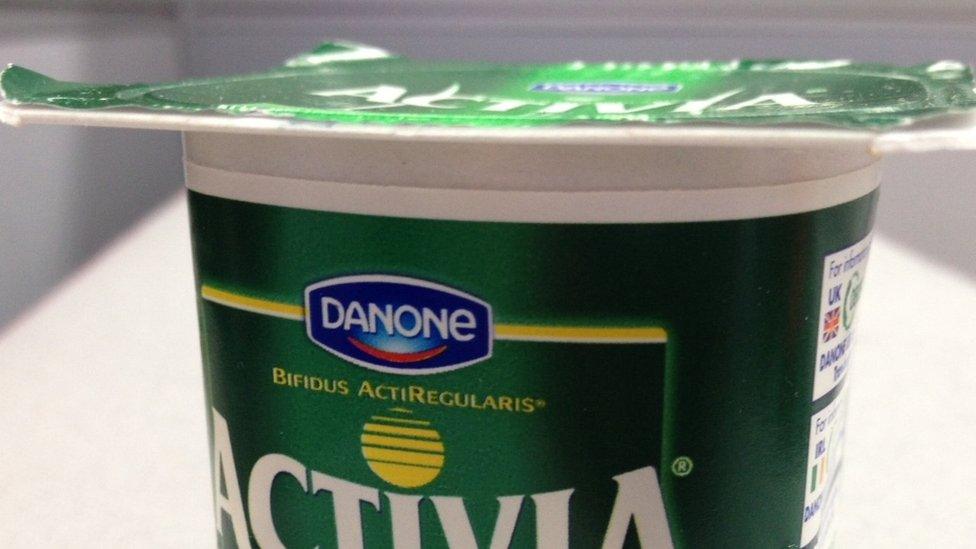Could 'yoghurt' powers hurt Global Britain?
- Published

It has become almost a bit of deal-making shorthand: yoghurt.
It's a way of getting at the idea that governments, when faced with corporate takeovers that they don't much like, fall back on spurious characterisations of the national interest to stop or impede them.
It refers to when the French political establishment in 2005 leapt to the defence, external of national "crown jewel" Danone to prevent an asset of such national importance as yoghurt falling into foreign hands.
The French government was, officially, only allowed to block deals in industries related to national defence or security. But it didn't really matter. PepsiCo of the US was sent packing, Danone lived on, and vital French interests were preserved.
Is the UK taking a step in the same direction?
John Fingleton, external, the former head of the Office of Fair Trading where he oversaw merger regulation, thinks it might be.
He will warn in a speech on Tuesday that government proposals to expand the ability to intervene in deals on security grounds amount to a "wolf in sheep's clothing".
More powers
It could, he warns, create an ill-defined mechanism which could then be used to extract commitments solely related to economic activity in the UK. And, he adds, this more restrictive approach to foreign investment could hurt the value of UK assets and "undermine government policy in relation to productivity growth, innovation policy, and trade post-Brexit".
Revising the takeover rules is a reasonably common hobby for the UK. The City's takeover watchdog has made repeated changes over the past 10 years, tilting the process in favour of bid targets and requiring bidders to include more detail of their plans.
And the government has given itself more powers too. It said last year that it would lower the threshold for government intervention in certain areas: advanced technology and the "dual use and military use sector". It cut the turnover threshold for intervention in those areas to £1m from £70m previously.
But it has also been consulting on much broader changes which would sweep away thresholds for intervention, introducing a new public interest power for the government - rather than an apolitical regulator - to intervene on national security grounds across a wide range of sectors.
That could, it says, involve calling in 200 cases a year, and potentially intervening to block or demand changes on 50 of them.
That would be massive step up in scrutiny: the government has only used its existing powers to intervene on security grounds fewer than 10 times since 2003, according to Mr Fingleton.
There are, as he will lay out in detail, various concerns here.
One is that it is increasingly hard to believe that any government, having handed itself broad powers to intervene wherever national security is imperilled, will be able to stick to its knitting. The temptation to test the boundaries of "national security" will simply be too great in the heat of the moment when a big UK name finds itself the subject of a takeover bid.
Open for business?
Which brings us back to yoghurt.
After all, look at the evidence of recent years. The hostile approach from Pfizer of the US for AstraZeneca quickly degenerated into political hysteria. The bid by Japan's Softbank for technology firm ARM caused soul-searching about jobs, investment and innovation - despite the fact that it was an agreed deal at a whopping great price.
And the government extracted a variety of commitments from Melrose as part of its purchase of engineering company GKN, even though that was a deal between two British companies where the supposed security concerns were debatable at best.

British pharmaceutical firm AstraZeneca resisted a US takeover
This instinct to protect national brands isn't unique to the UK, of course. Other countries have also taken steps to beef up their takeover protections in recent years. (Over in the US, which has long had a stringent but well defined system for vetting foreign takeovers, Donald Trump has used national security as the basis for trade tariffs that look to just about everyone like pure economics).
But it presents a potential contradiction for a government that is falling over itself to declare the country "open for business" after Brexit (and that has periodically talked about cutting business taxes to prove it).
Inward investment comes in various forms: Not just building factories, opening offices or creating jobs, but buying businesses too.
You can watch Newsnight on BBC 2 weekdays 22:30 or on Iplayer. Subscribe to the programme on YouTube, external or follow them on Twitter, external.
- Published11 October 2018
- Published4 October 2018